Gao Yusheng Making Friends,Not Enemies
2019-11-04byYinXing
by Yin Xing
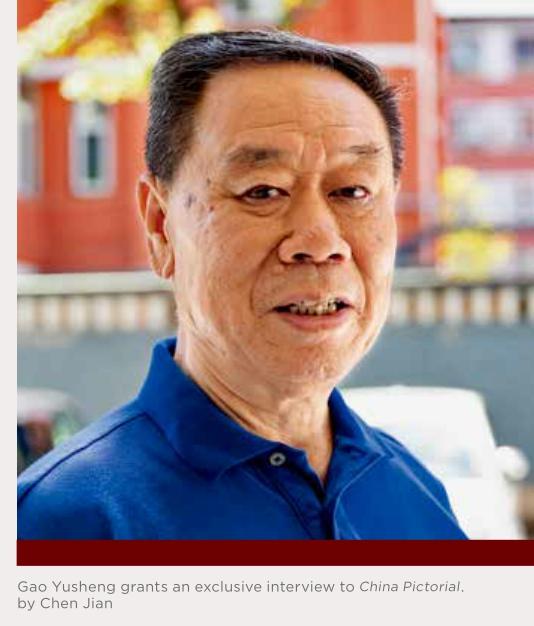
Decades ago, an East German-made train set off from Beijing and stopped in Ulan Bator in Mongolia before making its way to Moscow, capital of the Soviet Union, with the entire trip taking five and a half days. At the age of 35 at the time, Gao Yusheng was on the train. Upon seeing dotted green of Beijings winter transform into the snowy scenery of Moscow, Gao was flush with excitement for his impending job at the Chinese embassy in Moscow. With it, his nearly three-decade career as a diplomat was launched.
Normalization of Sino-Soviet Relations
Gao witnessed the adjustment and development of Chinas diplomatic policies in the 1980s. He considers it the start of a new chapter for Chinas diplomacy. “This ‘new chapter had a very important characteristic—we started adjusting our diplomatic policies to create favorable international conditions for Chinas reform and opening up and its modernization,” says Gao.
In 1979, China and the United States established diplomatic ties, bringing their relations into a new phase. At the same time, China began a plan to improve its relations with the Soviet Union step by step. In terms of the resumption of Sino-Soviet relations, the“three funerals diplomacy” introduced by Deng Xiaoping gained great acclaim. In 1982, Soviet leader Leonid Brezhnev passed away. China sent Huang Hua, then vice premier and foreign minister, to attend the funeral. Because Huang was the highest-ranking Chinese official to visit the Soviet Union since a breakdown in relations between the two countries during the 1960s, his visit broke the ice. Brezhnevs successors Yuri Andropov and Konstantin Chernenko died in 1984 and 1985, respectively. China sent vice premiers Wan Li and Li Peng to attend the respective funerals. These three visits laid a foundation for the normalization of Sino-Soviet relations.
At the end of 1984, Ivan Arkhipov, then-First Deputy Chairman of the Council of Ministers of the Soviet Union, was invited to visit China. An old friend of China, Arkhipov worked in China in the 1950s as an economic adviser. His visit reminded many Chinese people of the past friendship between the two countries and served as a catalyst to restore bilateral ties.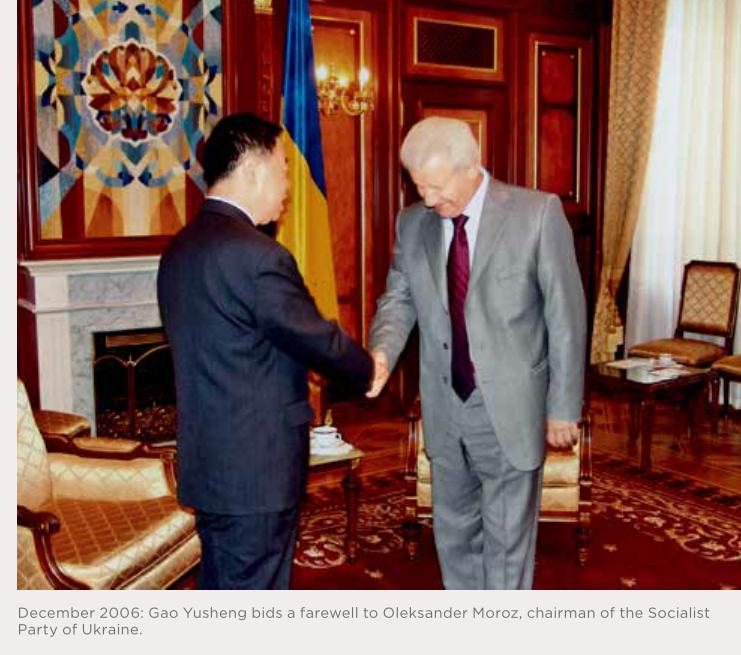
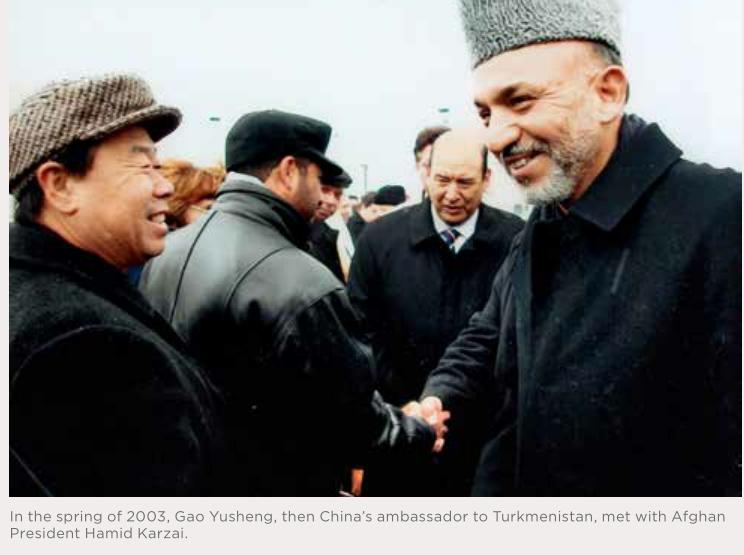
“Thanks to extensive diplomatic efforts of both sides, Sino-Soviet relations improved gradually,” recalls Gao. “The two countries started cooperating in many fields including in the United Nations. The rebound of relations not only improved Chinas external environment but also helped the country develop relations with the United States and other Western countries.”
“I arrived in Moscow on December 29, 1984, just a few days before the New Year,” recalls Gao.“Despite the festive atmosphere, I was struck by the shortage of supplies and low efficiency. People were queueing in long lines to buy goods. In a big food shop at Kalinin Street, the line of customers trying to buy meat extended from upstairs to downstairs. They had to wait a half day or even a whole day to buy the meat. At another supermarket, shop assistants placed oranges into mesh bags and weighed them, and then before the oranges could reach a shelf, a customer would grab them. Hardly anything spent any time on the shelves.”
During his tenure in the Soviet Union, Gao perceived the stagnation in local society, defects in the political system and the slow development of the economy and technology. Living standards hardly matched the countrys status as a superpower and the torchbearer of developed socialism. “Although I couldnt predict when it would collapse, I was always pessimistic about the future of the Soviet Union.”
At that time, as China just launched its reform and opening up, people had different ideas about the direction and road for reform. Some still thought China should learn from the Soviet Union and borrow its experience in economic reform.
“When I was working in the Chinese embassy in Moscow, I wrote many reports about the Soviet Unions system, especially its shortcomings as well as the difficulties and crises it was facing, in which I emphasized the dead end of the countrys development model,” reveals Gao. “My purpose was clear: I was hoping to prevent China from repeating the Soviet Unions mistakes. I just wanted to do something good for my country and people.”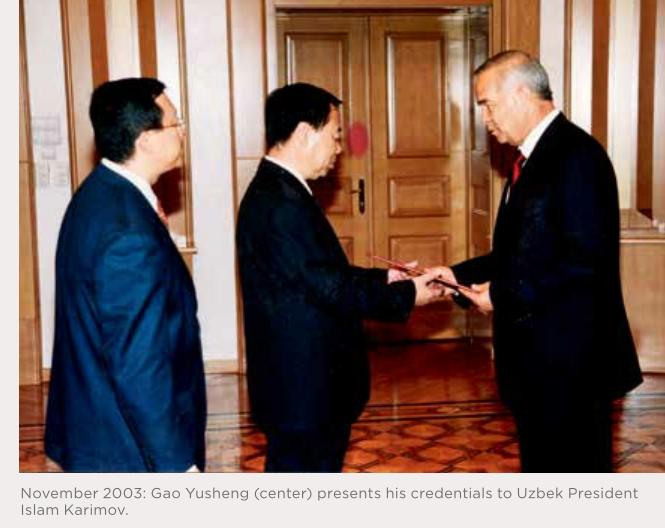
The new Sino-Soviet relationship was based on the Five Principles of Peaceful Coexistence and highlighted the non-ideological, equal, mutually beneficial and non-aligned relations. As preconditions for restoration of bilateral relations, Deng Xiaoping demanded the Soviet Union withdraw its military from Sino-Soviet borders and Afghanistan and urge Vietnam to withdraw its troops from Cambodia. From the perspective of the big picture of Chinas diplomatic strategy, Deng managed to control the pace of normalization of bilateral ties while guarding the interest of his country.“The restoration of the ties between China and the Soviet Union in the 1980s and the policies and tactics China implemented during the process represented remarkable achievements for Chinese diplomacy as well as Sino-Soviet relations at the time,” says Gao.
Cooperation with Principles
Between 2000 and 2007, Gao consecutively served as Chinas ambassador to Turkmenistan, Uzbekistan and Ukraine.
“My work in these three countries was smooth and pleasant,” says Gao.“While safeguarding the national interests of China and following the countrys foreign policy and relevant instructions, I made sure to respect my hosts and properly consider their interests and needs. I managed to make friends and promote cooperation between China and the three countries in sectors such as politics, culture, economics, trade, security, energy and infrastructure. As a diplomat, especially an ambassador, you have to make as many friends as possible in order to safeguard the interests of the country and complete every assignment. I developed a deep understanding about the importance of friends.”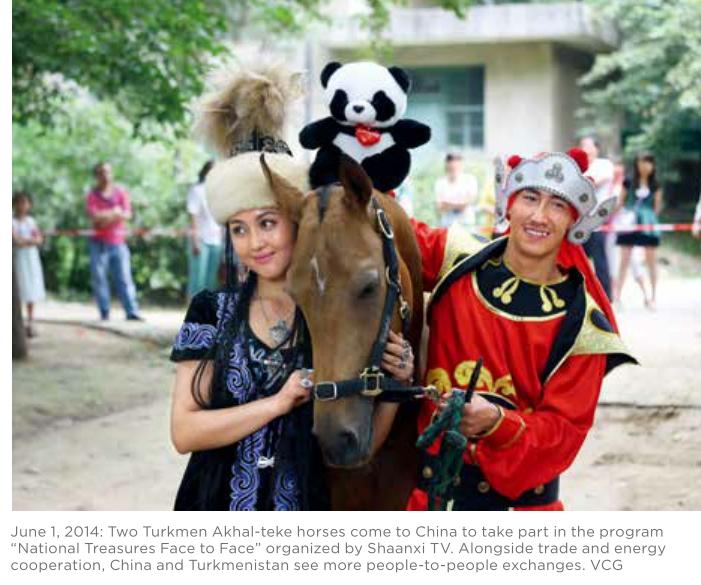
Chinas basic policy of diplomacy with neighboring countries is to treat them as friends and partners, to make them feel secure and to support their development. This policy is characterized by friendship, sincerity, reciprocity and inclusiveness. Friendship is a consistent principle of Chinas diplomacy with its neighbors. “China has devoted a lot of attention to its relations with countries in Central Asia,”notes Gao. “Chinese leaders visit these countries almost every year to maintain close contact. With Chinas rapid development and rising international status, Turkmenistan, Uzbekistan and Ukraine also attach great importance to developing their relations with China.”
In 2010, Gao retired from his post as the Deputy SecretaryGeneral of the Secretariat of the Shanghai Cooperation Organization with pride and profound feelings about his 20 years-plus diplomatic career.“Although times are different now, as the international order and the central role of the United Nations face challenges and the status and relations of various countries have changed, I think it is even more important that diplomats make friends rather than enemies, keep their heads down to complete their work and be ready to respond to changes anytime.”